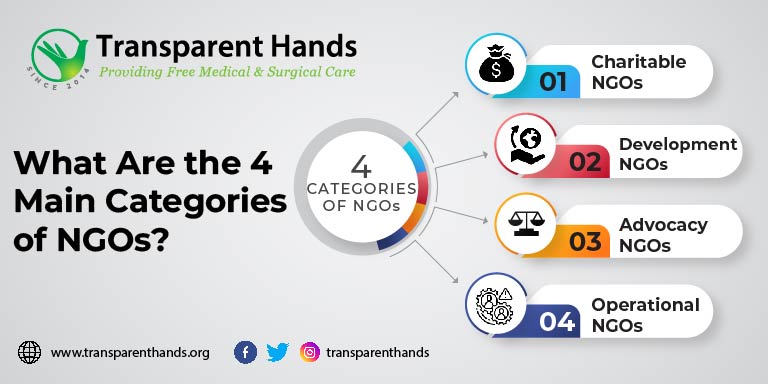What Are the 4 Main Categories of NGOs?

What are NGOs?
Non-governmental organizations (NGOs) are influential entities that operate independently of government control and are dedicated to addressing various social, economic, and environmental issues. These organizations play a crucial role in promoting positive change and providing essential services to communities worldwide. They play a critical role in both global and local development, implementing projects and advocating for policies that improve community welfare. Ranging from small local groups to large international bodies, there are 4 main categories of NGOs, operate in sectors like healthcare, education, human rights, and environmental protection.
They are funded through private donations, grants, corporate sponsorships, and sometimes government aid, ensuring their operational independence. They are funded through private donations, grants, corporate sponsorships, and sometimes government aid, ensuring their operational independence.
Here are the details of the main types of NGOs:
1. Charitable NGOs
Charitable non-governmental organizations are among one the main categories according to NGOs’ types and roles. They are also sometimes referred to as service NGOs and are primarily concerned with giving direct aid and support to persons or communities in need. These organizations are involved in humanitarian activities, such as delivering relief during crises, natural disasters, and other catastrophes. The main objective is to reduce poverty, improve living circumstances, and provide urgent necessities such as food, housing, healthcare, and education.
These organizations frequently rely on fundraising activities, contributions, and volunteer engagement to carry out their missions efficiently. They address social and humanitarian concerns by offering aid, support, and resources to people in need. They have a direct social impact through improving lives, strengthening communities, and solving structural challenges. Some of the well-recognized NGOs in this category are Transparent Hands, Oxfam, the Red Cross, and Save the Children.
2. Development NGOs
One of the main types of NGOs also called Development NGOs that work to promote long-term social and economic development. The main objective of such organizations is to support sustainable development by executing projects and initiatives that improve education, healthcare, infrastructure, gender equality, human rights advocacy, and economic opportunity in underserved communities. They frequently work with local communities, governments, and international organizations to push for legislative reforms, offer resources, and design initiatives that empower people and promote long-term development. Development NGOs have a long-term socioeconomic impact by tackling structural obstacles and fostering inclusive and equitable progress. CARE, ActionAid, and Plan International are examples of well-known development (NGOs).
3. Advocacy NGOs
Advocacy or watchdog organizations are among the types of NGOs. They play an important role in promoting social change and advocating for certain causes or concerns. The main objective of these organizations is to work for enhancing public knowledge, mobilize public opinion, and influence policymaking at the local, national, and worldwide levels. They also aim to influence public opinion, shape policies and hold governments accountable. They utilize a variety of ways to draw attention to social, economic, and environmental inequalities, including research, lobbying, public campaigns, and legal action. Amnesty International, Greenpeace, and Human Rights Watch are among the most well-known advocacy organizations.
4. Operational NGOs
Operational Non-Governmental Organizations (NGOs) are an important part of the non-profit sector, focusing on the implementation of projects and programs to solve specific social or environmental challenges. Unlike advocacy NGOs, which primarily focus on raising awareness, doing research, and lobbying, operational NGOs actively carry out on-the-ground operations and provide direct assistance to communities in need.
Top Non Government Organizations in Pakistan
They operate at the local, national, and international levels, cooperating with governments, other non-governmental organizations, and local communities to achieve their goals. These organizations frequently have a well-defined purpose and vision, as well as goals and objectives. They also play a critical role in enhancing the quality of life for marginalized groups, whether they are delivering medical help to rural locations, establishing schools and vocational training centers, providing clean water and sanitation infrastructure, or reacting to humanitarian emergencies.
To keep their operations running, these organizations frequently rely on a variety of financial sources, such as contributions, grants, partnerships, and fundraising efforts. They routinely collaborate with other groups, both nonprofit and government, to leverage resources, exchange knowledge, and increase their influence. Furthermore, they also play an important role in raising awareness about social concerns and pushing for policy reforms.
Conclusion
The importance and need for all 4 main categories of NGOs cannot be overstated. Charitable NGOs play an important role in giving urgent relief and assistance to people in need. Advocacy NGOs play an important role in promoting awareness, advocating for rights, and pushing social change. Operational organizations carry out or implement initiatives and programs on the ground to solve specific challenges and accomplish their declared goals. Finally, developmental (NGOs) contribute to long-term development by enhancing education, healthcare, infrastructure, and economic possibilities in underserved regions. Together, these NGOs play vital roles in developing community empowerment, tackling structural concerns, and ultimately striving toward a more fair, equitable, and sustainable society.










Leave Your Comments